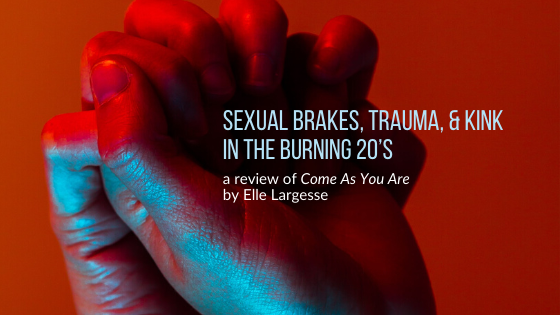Tl;Dr: It’s okay if your brain and body want sex when you are stressed. It’s okay if they want it less. Both are normal—even during a pandemic and an uprising. There’s science to prove it. Research also shows that big feelings (like fear of getting sick, or anger at injustice) can be processed and released before they do lasting harm to you or your life. I share excerpts from Emily Nagoski’s book Come As You Are and two others to show how we might be able to use kink to do the same thing.
This article is around 11200 words. If you’re not interested in the neuroscience of sexual brakes and accelerators or why we don’t have sex drives, you can skip to “How to stop stopping: taking your foot (and everything else) off the brake” to learn about using emotions to release stress. If you’re very low on energy and just want help, jump to “Completing the cycle while (ahem) laying in bed” for my recipe on how to use size kink to achieve that catharsis.
(Content tags: This article contains mentions of the pandemic, police brutality, racism, violence, murder, assault, AIDS, PTSD, depression, anxiety, and trauma responses. It also covers topics ranging from BDSM and impact play, to polyamory, to microphilia/macrophilia, and covers size dysmorphia and kink-related fantasies. I welcome help in tagging—please let me know when I have missed anything important.)
Sections in this article
- Sex in a tinderbox
- What a sex-research nerd can tell us about getting hot under pressure
- The audience for this book
- Sexual Accelerators & Sexual Brakes (half the point of this blog post)
- Are there differences for different genders?
- How to stop stopping: taking your foot (and everything else) off the brake
- You didn’t answer the question. How do I stop putting the brakes on?
- Completing the cycle while (ahem) laying in bed
- Everything we’re describing happens all the time in kink
- What this looks like for me: stress cycle sprints with a sizeshifter
- Are you ever small instead? What if you still feel upset at the end?
- What’s next? Size-themed guided meditations? Somatic revolution?
- The erotic as power
- The community part of “kink community”
Introduction
I didn’t expect that it would take a pandemic and a racial justice uprising for me to finally sit down and write a review about a phenomenal book on sex research for my kink blog. Here’s the reason I hope you’ll read this. People are having huge emotional responses that they don’t have the space or tools to fully process; they are also judging others/feeling ashamed for not wanting sex right now, while others are having the same response to those who do want sex right now. Research shows sex desire can decrease for some and increase for others during times of great stress, and that both are normal and healthy. Sex-positive spaces like #SizeTwitter should make space for both responses, and might already be able to provide tools to help process big emotions.
